JEE Exam > JEE Notes > Chemistry for JEE Main & Advanced > How to Study Organic Chemistry for JEE
How to Study Organic Chemistry for JEE | Chemistry for JEE Main & Advanced PDF Download
Organic Chemistry is an important part of the JEE syllabus. To do well, you need to understand the concepts clearly, remember key reactions, and practice solving problems. With the right plan, it can become one of your strongest subjects. This guide covers practical strategies that match the JEE syllabus to help you prepare better for both JEE Main and Advanced.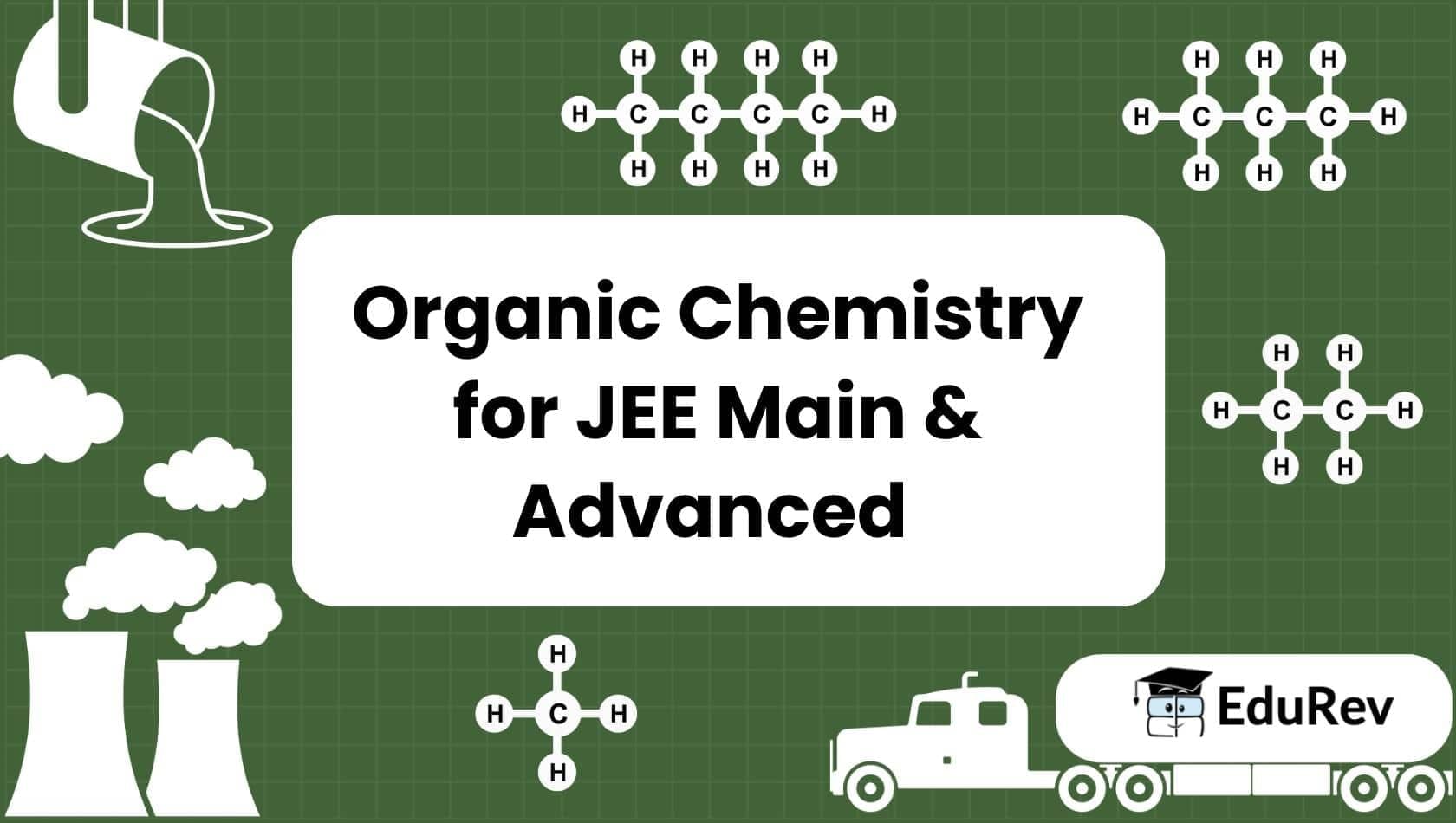
Understanding the JEE Organic Chemistry Syllabus
The JEE Organic Chemistry syllabus includes topics from both JEE Main and JEE Advanced. Below is a concise overview based on the standard syllabus:
- General Organic Chemistry: Nomenclature, isomerism (structural, stereoisomerism), hybridization, resonance, hyperconjugation, inductive effect, electromeric effect, and mesomeric effect.
- Hydrocarbons: Alkanes, alkenes, alkynes, aromatic hydrocarbons (benzene), and their reactions (addition, substitution, elimination).
- Haloalkanes and Haloarenes: Nucleophilic substitution, elimination reactions, and their applications.
- Alcohols, Phenols, and Ethers: Preparation, properties, and reactions.
- Aldehydes, Ketones, and Carboxylic Acids: Preparation, properties, nucleophilic addition, and oxidation-reduction reactions.
- Organic Compounds Containing Nitrogen: Amines, diazonium salts, and their reactions.
- Biomolecules: Carbohydrates, proteins, nucleic acids, and vitamins.
- Polymers: Classification, preparation, and properties of common polymers.
- Chemistry in Everyday Life: Drugs, chemicals in food, and cleansing agents.
- Practical Organic Chemistry: Purification, qualitative analysis, and identification of functional groups.
Here are some effective strategies to boost your preparation and performance!
Create a Structured Study Plan
- Syllabus Division: Break the syllabus into manageable sections with time allocation based on weightage:
- High Weightage (30–35%): Oxygen and nitrogen-containing compounds (alcohols, aldehydes, amines).
- Moderate Weightage (15–20%): Hydrocarbons, haloalkanes, haloarenes.
- Low Weightage (10–15%): Biomolecules, polymers, chemistry in everyday life.
- Daily Routine: Dedicate 1–2 hours daily to Organic Chemistry. Revise one topic, solve 20–30 problems, and note mistakes.
- Weekly Revision: Review reaction mechanisms and summaries weekly to reinforce retention.
- Study Plan for JEE: Access the expert-designed JEE study plan by EduRev, tailored to help you cover every topic efficiently and stay ahead in your preparation.
Build a Strong Foundation
- Focus Areas: Start with General Organic Chemistry (GOC), covering resonance, inductive effects, and hyperconjugation, as these are critical for understanding reaction mechanisms.
- Nomenclature and Isomerism: Master IUPAC naming and isomer identification (geometrical, optical, structural) for clarity.
- Resources: Use NCERT Class 11 and 12 textbooks to build a strong base, as JEE frequently tests NCERT-based concepts.
Master Reaction Mechanisms
- Understand, Don’t Memorize: Learn the “why” behind reactions (e.g., SN1/SN2, electrophilic addition, aldol condensation) to predict products for unfamiliar reactions.
- Key Reactions: Prioritize high-yield reactions like nucleophilic substitution (SN1/SN2), elimination (E1/E2), and electrophilic aromatic substitution. Create flowcharts mapping reagents, conditions, and products.
- Practice: Solve mechanism-based problems from Advanced Problems in Organic Chemistry by MS Chauhan.
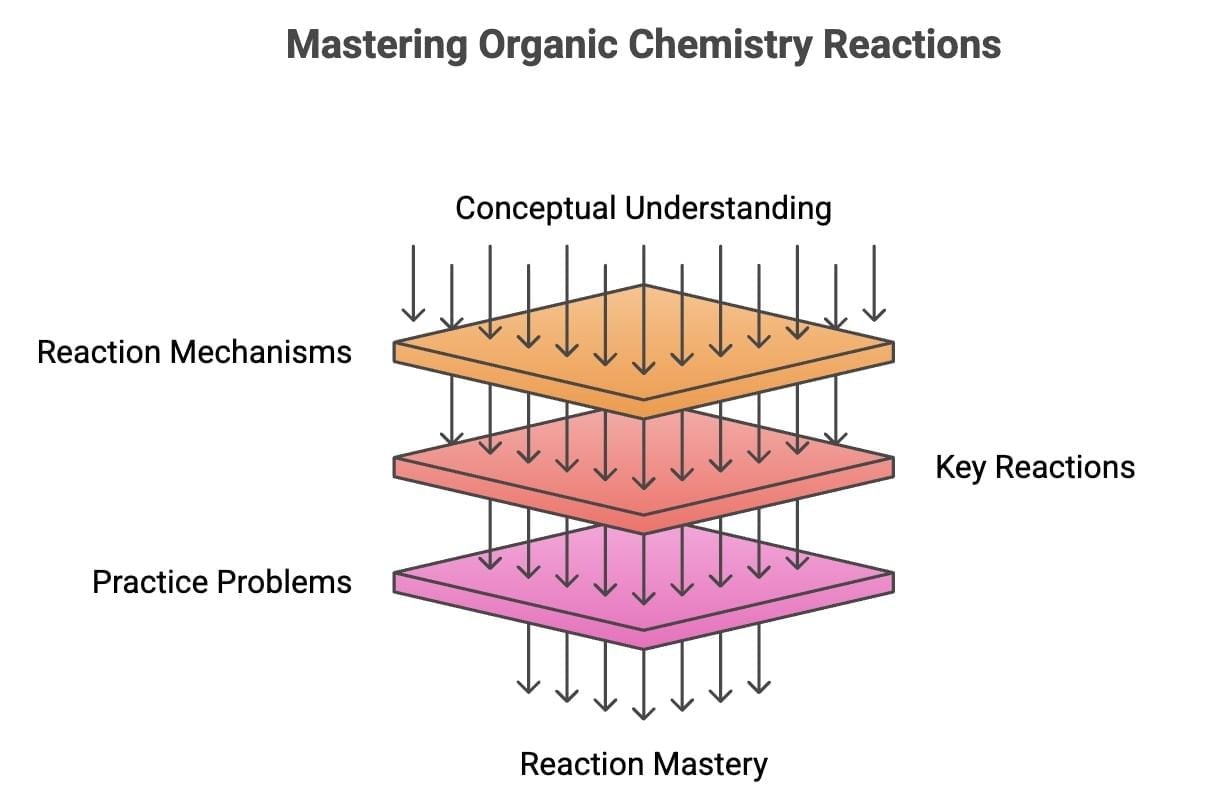
Utilise Quality Study Materials
- NCERT Textbooks: Use Class 11 and 12 NCERT books for a strong conceptual base, as JEE often tests NCERT-based questions.
- Recommended Books:
- Organic Chemistry by Morrison & Boyd: For in-depth conceptual understanding.
- Advanced Problems in Organic Chemistry by MS Chauhan: For JEE Advanced-level practice.
- Organic Chemistry by Solomon & Fryhle: For clarity on complex topics.
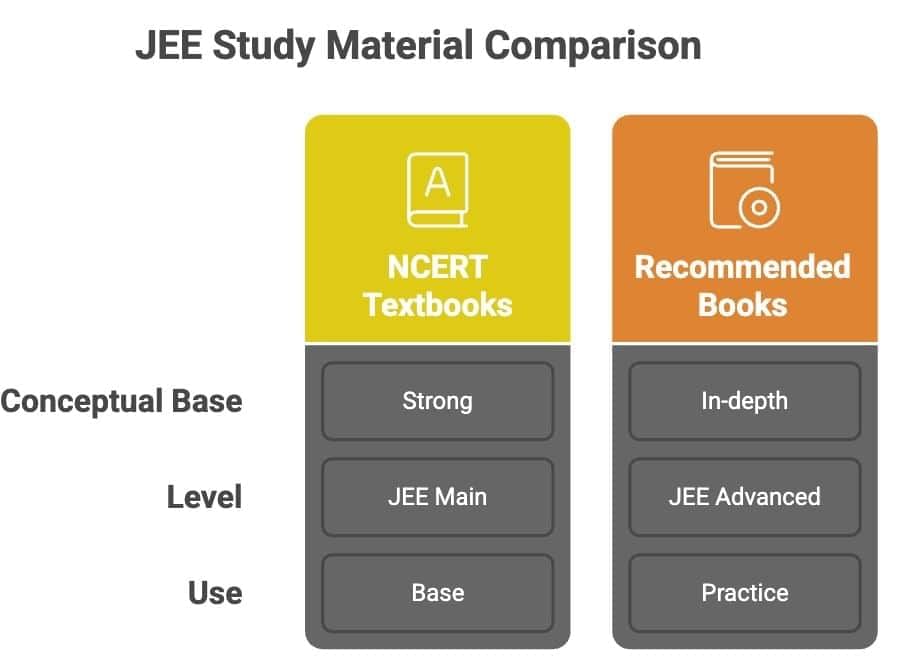
Use Memorisation Techniques
- Mnemonics and Charts: Use mnemonics for reaction sequences (e.g., functional group priority: Carboxylic > Aldehyde > Ketone > Alcohol > Amine). Create wall charts for quick revision of reagents and named reactions.
- Flashcards: Make flashcards for reagents, catalysts, and named reactions (e.g., Clemmensen reduction, Cannizzaro reaction).
- Formula sheet: Prepare a one-page formula sheet for each chapter—include key formulas, units, and constants. Keep it on your desk or stick it near your study area for quick recall before practice or mock tests. This helps reinforce memory and reduces panic during revision.
- JEE Revision Notes: Make or access short, crisp revision notes for every chapter—especially reactions, concepts, and exceptions. Use EduRev’s ready-made revision notes to save time and boost last-minute preparation. They’re perfect for daily recaps and pre-test brushing.
- Tips and tricks for JEE: Learn shortcut techniques, elimination tricks, and time-saving methods for Physics calculations, tricky Chemistry questions, and Math problem-solving. EduRev’s curated tips help you avoid silly mistakes and improve accuracy under pressure.
Prioritize Practice
- DPPs: Incorporating daily practice papers into your preparation is a powerful strategy to build confidence, enhance problem-solving skills, and solidify conceptual understanding.
- Mock Tests: Take timed mock tests to simulate exam conditions, focusing on accuracy and time management.
- Previous Years’ Papers: Analyze JEE Main and Advanced papers from the last 10 years to identify patterns. Expect 6–8 questions in JEE Main and 5–7 in JEE Advanced from Inorganic Chemistry.
- Error Analysis: Maintain a notebook to categorise errors (conceptual, calculation, or careless) and revisit them regularly.
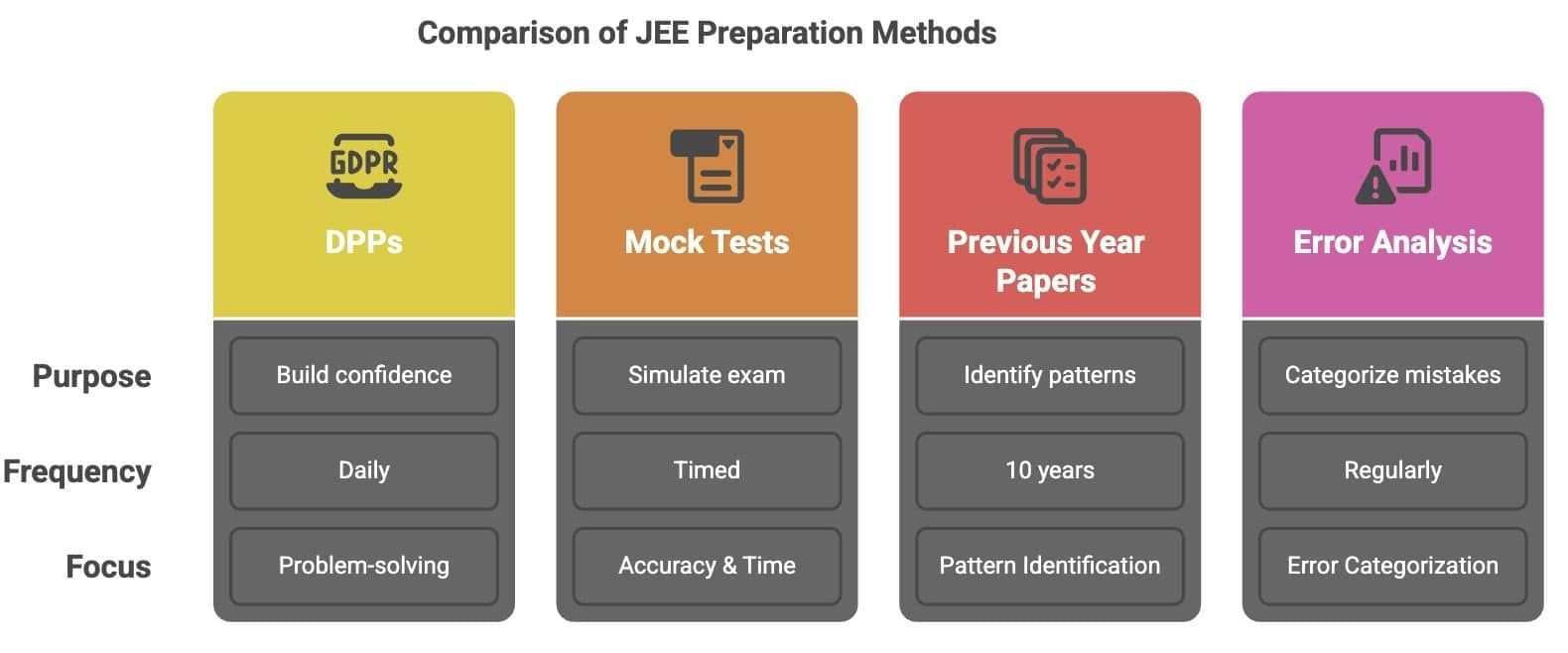
Master Practical Organic Chemistry
- Qualitative Analysis: Learn tests for functional groups (e.g., Tollens’ test for aldehydes, Fehling’s test for reducing sugars).
- Purification Techniques: Memorize methods like distillation, crystallisation, and chromatography.
- Practice: Solve lab-based questions, as they occasionally appear in JEE.
Solve Previous Years’ Papers
- Purpose: Analyse JEE Main and Advanced papers from the last 10 years to identify question patterns.
- Question Distribution: Expect 8–10 questions in JEE Main and 6–8 in JEE Advanced from Physical Chemistry.
- Approach: Categorise questions by topic and difficulty to prioritize practice.
Exam Day Tips
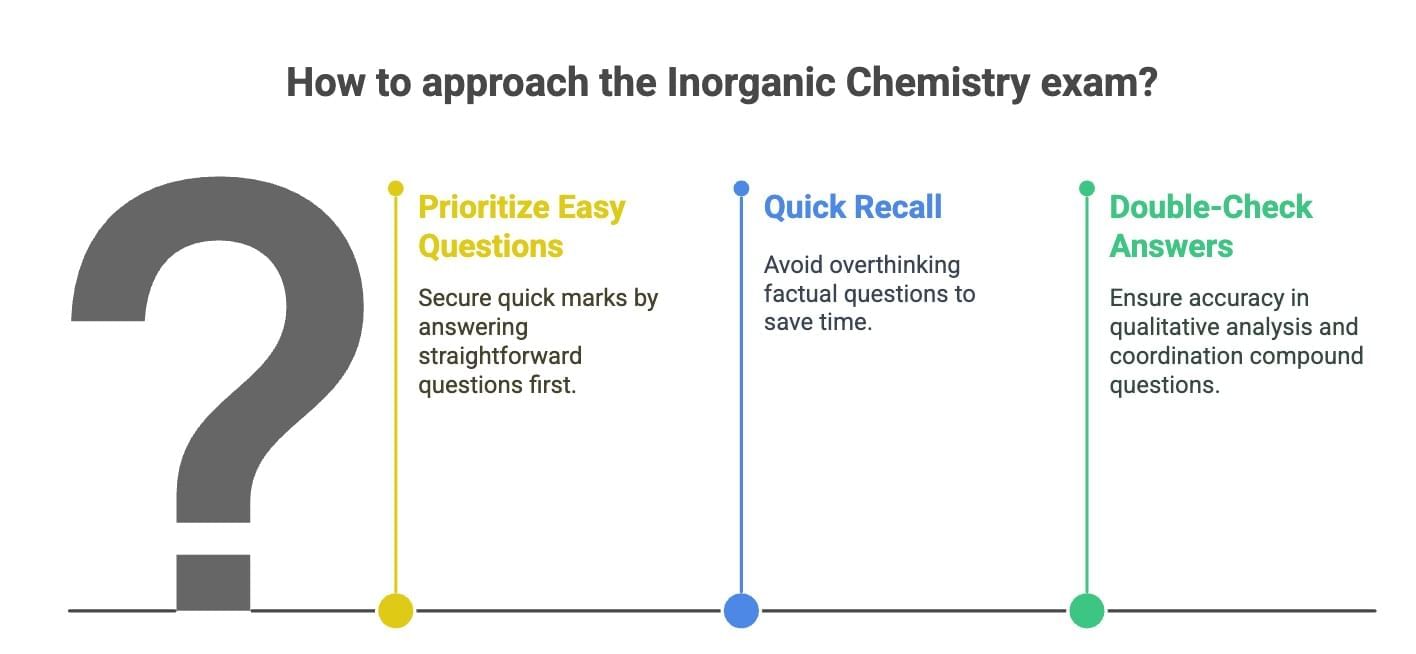
- Prioritize Easy Questions: Start with straightforward questions (e.g., nomenclature, functional group identification) to secure quick marks.
- Avoid Overthinking: If stuck on a reaction mechanism, move on and revisit later.
- Double-Check: Recheck answers for isomerism and reaction product questions to avoid errors.
Additional Tips for Success
- Consistency: Study Organic Chemistry daily to retain reactions and mechanisms.
- Health and Well-being: Maintain 6–8 hours of sleep, regular exercise, and a balanced diet to stay focused.
- Motivation: Set short-term goals (e.g., mastering alkenes in a week) and reward yourself to stay motivated.
The document How to Study Organic Chemistry for JEE | Chemistry for JEE Main & Advanced is a part of the JEE Course Chemistry for JEE Main & Advanced.
All you need of JEE at this link: JEE
|
366 videos|829 docs|301 tests
|
FAQs on How to Study Organic Chemistry for JEE - Chemistry for JEE Main & Advanced
| 1. What are the key topics covered in the JEE Organic Chemistry syllabus? |  |
Ans.The JEE Organic Chemistry syllabus includes various essential topics such as the basic concepts of organic chemistry, nomenclature, isomerism, reaction mechanisms, alkanes, alkenes, alkynes, aromatic compounds, functional groups, and various reactions involving these compounds. It also covers the study of biomolecules and polymers, as well as the synthesis and reactivity of different organic compounds.
| 2. How can I effectively memorize organic chemistry reactions for the JEE? |  |
Ans.To effectively memorize organic chemistry reactions for the JEE, students should focus on understanding the underlying principles behind each reaction rather than rote memorization. Creating flashcards for different reactions, practicing reaction mechanisms, and regularly solving previous years' questions can reinforce memory. Additionally, using mnemonic devices to remember reaction sequences and practicing drawing reaction pathways can be helpful.
| 3. What study resources are recommended for mastering organic chemistry for the JEE? |  |
Ans.Recommended study resources for mastering organic chemistry for the JEE include NCERT textbooks, reference books like "Organic Chemistry" by Morrison and Boyd, and "Organic Chemistry" by Paula Yurkanis Bruice. Online platforms offering video lectures, practice questions, and mock tests can also be beneficial. Joining study groups or coaching classes can provide additional support and guidance.
| 4. What strategies should I use to tackle organic chemistry problems in the JEE exam? |  |
Ans.To tackle organic chemistry problems in the JEE exam, students should first read the questions carefully to understand what is being asked. Breaking down complex reactions into smaller steps and identifying the relevant concepts can simplify problem-solving. Regular practice with a variety of question types and timed mock tests will help improve speed and accuracy. It is also important to manage time effectively during the exam.
| 5. How important is the understanding of reaction mechanisms in JEE Organic Chemistry? |  |
Ans.Understanding reaction mechanisms is crucial in JEE Organic Chemistry as it helps students comprehend how and why reactions occur. This knowledge not only aids in memorizing reactions but also in solving unfamiliar problems. A strong grasp of mechanisms allows students to predict the products of reactions and understand the conditions required for specific transformations, which are often tested in the JEE.
Related Searches
















